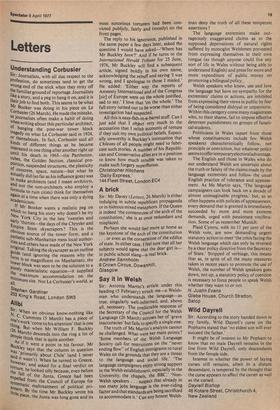Say it in Welsh
Sir: Antonia Martin's article under this heading (5 February) struck me—a Welshman who understands the language—as true, singularly well-informed, and, above all, necessary. The predictable response of the Secretary of the Council for the Welsh Language (26 March) accuses her of 'grave inaccuracies' but fails to specify a single one. The truth of Ms Martin's analysis cannot be challenged. What were her main points? 'Some members of the Welsh Language Society call for restrictions on the "never ending flow" of English immigrants to rural Wales on the grounds that they are a threat to the language and social life.' The language campaigners enjoy strong support in the Welsh establishment, especially in the University. the chapels, the BBC.' NonWelsh speakers . . suspect that already in too many jobs language is the over-riding factor and that standards are being sacrificed to accommodate it.' Can any honest Welsh
man deny the truth of all these temperate assertions?
The language extremists make outrageously exaggerated claims as to the supposed deprivations of natural rights suffered by monoglot Welshmen prevented from expressing themselves in their own tongue (as though anyone could live any sort of life in Wales without being able to understand English) and press for more and more expenditure of public money on promoting a bilingual policy..
Welsh speakers who know, use and love the language but have no sympathy for the extremists' claims or actions, are inhibited from expressing their views in public by fear of being considered disloyal or unpatriotic. Within this category come many magistrates who, to their shame, fail to impose effective deterrent punishments on groups of fanatical students.
Politicians in Wales (apart from those whose constituencies include few Welsh speakers) characteristically follow, not principle or conviction, but whatever policy seems to offer temporaryelectoral advantage.
The English and those in Wales who do not understand Welsh are uncertain about the truth or falsity of the claims made by the language extremists and followthe usual English practice of tolerance and appeasement. As Ms Martin says, 'The language campaigners can look back on a decade of almost unimaginable progress,' but, as so often happens with policies of appeasement, every demand that is granted is immediately succeeded by more and more extreme demands, urged with passionate vociferation. Some of us remember Munich, Plaid Cymru, with its 11 per cent of the Welsh vote, are now demanding urgent statutory action to meet 'the crisis facing the Welsh language which can only be reversed by a clear policy directive from the Secretary of State.' Stripped of verbiage, this means that as, in spite of all the many measures taken in recent years to promote the use of Welsh, the number of Welsh speakers goes down, not up, a statutory policy of coercion is necessary to force people to speak Welsh whether they want to or not.
H. Justin Evans Glebe House, Church Stretton, Salop
































 Previous page
Previous page